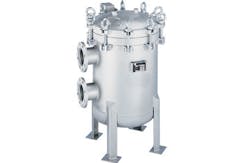Having thrown strikes for nearly two centuries now, Lake Forest, Ill.-based Brunswick Corp. says it had another big hit with a two-stage filtration process used to treat water used in the machining center at its plant in Reynosa, Mexico, where bowling balls are made.
The company, founded by Swiss immigrant John Moses Brunswick, originally opened for business in 1845 as a manufacturer of carriages. Soon after, however, the founder took a tremendous interest in billiards and decided to manufacture billiard tables, which until then were mostly imported from England.
His tables quickly became a commercial success and the business has been on a roll ever since. A major part of that on-going success was expansion into the sport of bowling, including the manufacture of balls, pins and bowling-alley equipment.
Further, late in the 19th century, Brunswick revolutionized the way bowling balls were made by using vulcanized rubber. Before that, balls actually were made of solid wood. Today’s balls are made with engineered plastics.
Outline of a challenge
Most of the Brunswick bowling balls are produced at the company’s plant in Reynosa, Mexico. There, water is used as a lubricant and cooling fluid to machine the balls to a precise roundness and help bring about the necessary high-gloss finish.
The by-product of that precision is a buildup of small plastic particles that must routinely be removed from the water. A hydraulic fluid used during the process and grease that keeps the machinery properly lubricated further muddies the water. Chemicals also are added to the water to prevent unwanted foaming.
To remedy that, Brunswick relied on two antiquated gravity-filtration systems with paper-roll media to clean the mix of water, oil, plastics and chemicals. Maintaining the filters cost approximately $1,500 per month, which might have been acceptable had the filters been operating efficiently, but the filters were not.
Meanwhile, to comply with stringent water regulations, and due to the buildup of hydrocarbons and organics, the rancid water had to be regularly hauled away and replenished with a fresh, clean supply. This cost Brunswick another $2,000 per month.
Expensive, inefficient and polluting, the filtration system at the Brunswick Reynosa plant had to go.
Succinct solution
Eaton Corp. is an industrial and integrated operating company best known as a power management company. Its hydraulics group includes Eaton’s filtration business.
Eaton developed a two-stage filtration process for the Reynosa plant. The first stage, a five-station Moduline bag filter vessel with nylon-mesh filter bags, was to remove the coarse plastic particles. Next, a six-bag Maxiline filter with polypropylene felt bags was for final polish.
This second step was to ensure clean water went back into the system. At the end of each work week, maintenance staff installed Eaton oil adsorption inserts in the Moduline, and Brunswick ran the system to remove any further traces of oils and hydrocarbons.
Moduline systems, says Eaton, are ideal for applications, like Brunswick’s, where the flow rate is too high for a single bag filter housing. Each vessel can be shut off individually for cleaning and bag replacement while maintaining system flow. The manifold assembly permits the flow to go through all housings simultaneously with a single inlet and outlet connection.
Eaton says its Maxiline systems deliver a user-friendly, cost-effective filtration solution for higher flow rates, providing a solution for the high-volume, highly efficient Brunswick requirements.
Recordable results
Maxiline MBF HE multi-bag housing’s low profile reduces housing height to make bag changing easier. Its unique three-point hold-down ensures bag sealing for by-pass free filtration. The Moduline system includes a compact and efficient assembly of two or more single bag housing units. The multi-vessel arrangement assures continuous flow rates.
Since completion of the Eaton conversion, water quality and supply problems are no longer an issue. Brunswick, reports Berthold, has not had to pay to discharge water for six months. Energy, labor, supplies and maintenance costs associated with the old machines have been eliminated, and so have the costs associated with the anti-foaming chemicals.
"At the end of the day, the water quality to the machining center was excellent and all rancidity problems were effectively eliminated as well as the need to haul and dispose of water," explains Carl Berthold, regional sales manager for Eaton. "That’s great news for us because, regardless of water application, Eaton is dedicated to minimizing negative impact on the environment anywhere in the world.
"The Moduline/Maxiline combination has paid for itself in seven months," notes Berthold. "That’s an ROI that any company would be very happy to throw at you."
Eaton is a diversified power management company providing energy-efficient solutions that help our customers effectively manage electrical, hydraulic and mechanical power. The company is a global technology leader in electrical products, systems and services for power quality, distribution and control, power transmission, lighting and wiring products; hydraulics components, systems and services for industrial and mobile equipment; aerospace fuel, hydraulics and pneumatic systems for commercial and military use; and truck and automotive drivetrain and powertrain systems for performance, fuel economy and safety.
